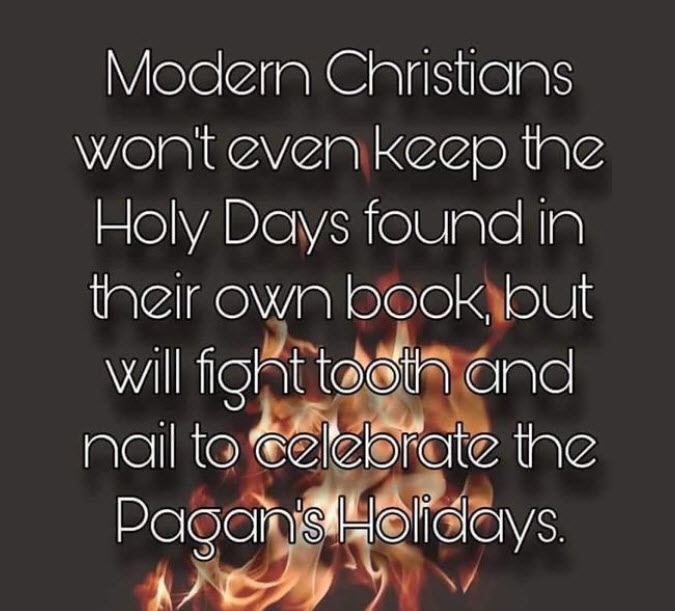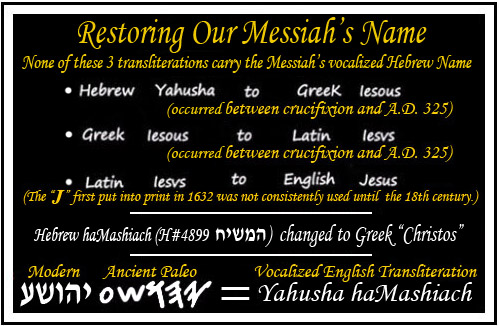The SHOCKING Truth About Christmas
The SHOCKING Truth
About Christmas

Disclaimer: The Scripture verses have been restored to reflect the true sacred name of Yahuah and Yahusha, but because this article was written by one who was not versed in the sacred names it is therefore replete with the replacement terms of the Lord, God, and Jesus Christ.
“We Americans [and much of the world] take Santa Claus, presents, holly, evergreen trees, carol singing, and all the other pleasant Christmas customs very much for granted. How intriguing it is to trace them to their origins. Many of our cherished traditions are buried deep in the pagan past. In fact, when Christmas was first officially established, the date coincided with ancient celebrations of the sun’s rebirth at the winter solstice. The [Roman Catholic] church saw no reason to destroy the old customs, and so they were adopted to fit our celebration of the birth of Christ.” 1
Prepare yourself because it may come as quite a shock to discover the true meaning and origin of the Christmas celebration. For decades we Christians [both Catholic and Protestant] have trimmed our trees, decorated our houses with lights and garlands, exchanged gifts, and propagated the tale of a white-whiskered fat man in a red suit being pulled across the sky by reindeer! But have we ever stopped to wonder about the significance of these Christmas customs? Where do they come from? And what could they possibly have to do with the birth of Christ? By uncovering the truth about Christmas origins and customs, we may realize that it is not the innocent Christ-glorifying celebration that it seems on the surface. Instead, we may discover sinister implications in many Christmas practices and origins heavily steeped in ancient pagan idolatry. Once you know the shocking truth about Christmas, as the facts are presented in this article, you may well wonder whether Christians should celebrate it at all! As a matter of fact, for all of the reasons given here, many sincere Christians have forsaken this holiday altogether. “And ye shall know the truth, and the truth shall make you free” (John 8:32). Here, then, is the shocking truth:
1. Christ, the Messiah, was not born on December 25th.
Although Christians everywhere observe this day as the birth date of the Messiah, we know that He was definitely not born on December 25th or at any time during the winter season. At least two factors make this quite evident. Note what the Bible records concerning the time of Jesus’ birth:
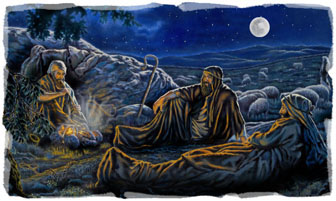 A.) “And there were in the same country shepherds abiding in the field, keeping watch over their flock by night” (Luke 2:8). As these shepherds were watching their sheep by night in the open fields, the angel came to them with the message of the birth of Christ. It has well been established that the shepherds of Judea did not themselves abide, nor did they keep their flocks in these open fields any later than about the end of October due to the piercing nature of the winter wind, rain, and cold.2 “The shepherds always bring their flocks in from the mountain slopes and fields not later than the fifteenth of October.” 3 Obviously, the birth of Christ could not have occurred as late in the winter season of December 25th.
A.) “And there were in the same country shepherds abiding in the field, keeping watch over their flock by night” (Luke 2:8). As these shepherds were watching their sheep by night in the open fields, the angel came to them with the message of the birth of Christ. It has well been established that the shepherds of Judea did not themselves abide, nor did they keep their flocks in these open fields any later than about the end of October due to the piercing nature of the winter wind, rain, and cold.2 “The shepherds always bring their flocks in from the mountain slopes and fields not later than the fifteenth of October.” 3 Obviously, the birth of Christ could not have occurred as late in the winter season of December 25th.
B.) The Bible records that at the time of the Messiah’s birth, Caesar Augustus had decreed that “all the world should be taxed . . . And all went to be taxed, every one into his own city” (Luke 2:1, 3). It was because of this tax that Joseph traveled to Bethlehem “to be taxed with Mary, his espoused wife, being with child” (vs. 5). While in Bethlehem, unable to secure a room in which to lodge, Mary delivered her child in a stable behind an inn. Indeed, this could not have occurred in the winter since travel at that time of year was very difficult. Caesar would not have ordered such a taxation then since it would have been virtually impossible for everyone to comply. Travel was so bitterly hard and hazardous during the deep winter season that Jesus himself told the people to pray that their flight at the end of this age would not be in winter, “But pray ye that your flight is not in winter . . .” (Matthew 24:20). In fact, history records that these taxations always took place at the end of harvest, which was sometime in September or October, a much more logical time for taxation and travel.4 Obviously, Christ could not have been born on December 25th. His birth date was probably sometime in the fall of the year, but no exact day can be determined. Even the Roman Catholics are compelled to admit, “The date of Christ’s birth is not known.” 5 [At the writing of this article, the Messiah’s birthdate was not known, but it has now been discovered. The evidence found in Scripture is hidden in plain sight but only for those who have eyes to see. Our Messiah’s True Prophetic Birthdate.]
Dear reader, isn’t it amazing that no one knows the date of the most important birth in the history of humankind? We know the birth dates of many famous, ancient men, from the Caesars to the Pharaohs, and in fact, “… in Egypt, birthday celebrations can be documented back to the 13th century BC.”6 But there is not one single reference in all 66 books of the Bible, and not one mention in early church literature pinpointing the date of Christ’s birth. Obviously, God did not want us to know the date Christ was born! We must remember that the Son of God preexisted from eternity with the Father. Perhaps for us to affix a “date of birth” to Christ, who always existed, is to detract from His divinity. One thing is sure: if God wanted the church to celebrate the birth of His Son, He would have told us to do so! Reasonable minds can only conclude that the reason the Bible is silent on the subject is that it was never God’s intention for Christ’s birthday to be celebrated!
However, we do celebrate Christ’s death! It is through His death and atoning sacrifice that we are reconciled to God and have forgiveness of sin. 7 Every time we partake in communion with the bread and cup, we celebrate the death that purchased our redemption (1 Corinthians 11:23-28).
2. Christmas is not a Bible doctrine.
One author asked: “… What was Christmas? Had Christ or His apostles made it a holy day?” Is there any passage anywhere in the Bible encouraging us to celebrate Christ’s birth? Emphatically NO! This author continues and answers himself: Christmas “. . . was a survival of the old pagan Saturnalia.” 8
Another writes: “If our blessed Lord had wanted us to celebrate His birthday. He would have told us when to celebrate it and how to celebrate it. But Christ never told anyone to celebrate His birthday. Furthermore, we know from the Bible and from church history that the apostles and the early church never celebrated Christ’s birthday. The Bible is God’s complete and final revelation to man, and it tells us everything we need to know for our spiritual lives (II Timothy 3:16). We don’t have to go outside the Bible for anything. God’s word tells us how we’re to worship, how we’re to give money for the support of the Lord’s work, how to evangelize the lost, how to observe the Lord’s supper and everything else pertaining to the Christian life. But not once in the Bible does God tell us to celebrate Christmas! We’re told to remember the Lord’s death, but nowhere are we told to celebrate His birth. God’s people are supposed to be Bible people. We’re supposed to live by the teaching of God’s holy Word. So the very fact that Christmas is never mentioned in the Bible is sufficient reason for us not to have anything to do with it.” 9
3. December 25th does have profound religious significance
Although we have clearly demonstrated that December 25th was not Christ’s birthday, that day does have profound religious significance. In fact, long before Christ was born, December 25th was the most widely recognized and celebrated holiday of ancient times among the idolatrous nations. This day was universally recognized and celebrated as the birthday of the sun god, Mithra, who was also known by other names in different parts of the world. The birthday of other sun gods, such as Osiris, Horus, Hercules, Bacchus, Adonis, Jupiter, Tammuz, Saturn, etc., was celebrated on December 25th also. Christmas originated with pagan sun worship! As one writer says: “Instead of this being the time of our Savior’s birth, it was the very day and season on which the pagans, for centuries, have celebrated the birth of their sun god!”10 It was the celebration of the winter solstice! It was a time for merriment, revelry, and drunkenness (the very same way many still celebrate it today). Most of our current Christmas customs, such as decorated evergreen trees, lights, holly and mistletoe, exchanging presents, parties, and revelry, all were essential elements of this pagan winter solstice.
History records just how firmly entrenched these heathen celebrations had become in society, and when the Roman Catholic Church could not persuade the public to give up these idolatrous practices, they adopted them! The Catholic Church adopted every pagan aspect of this abominable custom, including the date, and simply renamed it. Now, instead of representing the birth of Tammuz or Saturn (or any of the sun gods), it was supposed to celebrate the birth of Christ. They mixed Christianity with paganism! “It was in the fifth century that the Roman Catholic Church commanded that the birth of Christ be observed forever on December 25th, the day of the old Roman feast of the birth of Sol–one of the names of the sun god.” 11 No honest investigator could deny these plain facts. When you celebrate Christmas, you are actually participating in an ancient sun worship ritual. It is nothing less than sacrilegious idolatry! 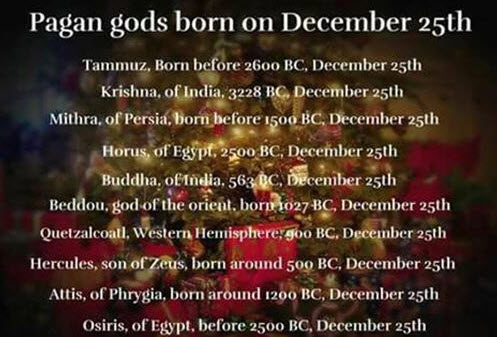 The Encyclopedia Britannica has this to say about Christmas: “Its observance as the birthday of the Savior is attended with secular customs often drawn from pagan sources; indeed, both Christmas and Epiphany, which falls 12 days later on January 6th, are transformed pagan celebrations of the winter solstice, and so closely linked that their origins cannot be discussed separately. December 25th in Rome . . . was the date of a pagan festival . . . the birthday of the unconquered sun (god).”12 (Italics mine.)
The Encyclopedia Britannica has this to say about Christmas: “Its observance as the birthday of the Savior is attended with secular customs often drawn from pagan sources; indeed, both Christmas and Epiphany, which falls 12 days later on January 6th, are transformed pagan celebrations of the winter solstice, and so closely linked that their origins cannot be discussed separately. December 25th in Rome . . . was the date of a pagan festival . . . the birthday of the unconquered sun (god).”12 (Italics mine.)
Nothing could be plainer. December 25th is the celebration of pagan sun deities, not the birthday of Christ! The Bible says, “Put away the strange gods that are among you, and be clean . . .” Genesis 35:2. Christians should have nothing to do with it.
4. The Christmas celebration is an abominable mingling of truth with falsehood
It mingles right with wrong and pollutes the purity and truth of Christianity with the abominable practices of heathenism. How dare we pollute the holy name of Jesus with the vile customs of sun worship? How dare we mix the purely pagan elements of Christmas, such as the Christmas tree, boughs, wreaths, holly, mistletoe, Santa Claus, exchanging of presents, etc., with the true worship of Christ as commanded in the Bible? Do you honestly think God looks with favor upon such a mixture?
“Thus saith Yahuah Alahim; are ye polluted after the manner of your fathers? For when ye offer your gifts . . . ye pollute yourselves with all your idols, shall I be inquired of by you? . . . Pollute ye My sacred Name no more with your gifts, and with your idols.” Ezekiel 20:30, 31, 39
“For what fellowship hath righteousness with unrighteousness? And what communion hath light with darkness? And what concord hath Messiah with Belial? Or what part hath he that believes with an infidel? And what agreement hath the temple of Yahuah with idols?” II Corinthians 6:14-16
It is an abomination to God to take a thoroughly idolatrous holiday, and with all of its attending practices and customs, simply change the name and call it “Christian.” There is nothing Christian about Christmas! It is 100 percent pagan. One author has well noted: “Christmas looks out at us from the shadow of the groves of the Druids who knew not Christ, and it is dear to those who now renounce the name of Christian. The Christmas log is, but the Saxon Yule log burning on the English hearth, and the blazing holiday temples of Saturn shine again in the illuminated Christian churches. It is the pagan mistletoe under which the Christian youth kisses the Christian maid. It is the holly of the old Roman Saturnalia, which decorates Brace Bridge Hall on Christmas Eve. The huge smoking bacon or beef and the flowing oceans of ale are but survivors of the tremendous eating and drinking of the Scandinavian Valhalla. The Christian and ante-Christian feelings blend in the happy season, and the Christian observance mingles at every point with the pagan rites. It is not easy to say where paganism ends and Christianity begins.” 13
How clear it is for all who have eyes to see! Blatant, outright paganism has been incorporated into the church of Jesus Christ through the Christmas celebration. What an unholy amalgamation to mix the name of the holy Son of God with the depraved deities of the ancient heathen nations! Originally, the church would have nothing to do with vile winter solstice celebrations. But the Roman Catholic church, under Constantine, began “the adoption under Christian forms not only of pagan rites and ceremonies but also of pagan festivals. To reconcile heathen converts to the new faith, these relics of paganism, like antique columns transferred from ancient temples to adorn Christian churches, were freely incorporated into the Christian ceremony. Thus, it was that Christmas was transferred to the 25th of December, the time of the Roman Saturnalia, and became invested with much of the paraphernalia of the heathen festival.” 14 In Rome, the Saturnalia was the vilest, most immoral feast that ever disgraced that pagan city. It was a season of license, drunkenness, and debauchery. The spirit of revelry prevailed, and the entire city wantonly indulged in the filthiest sorts of immorality imaginable.
Dear reader, isn’t it plainly evident that though its name has been changed, the same spirit of merriment is present in our modern Christmas celebrations? There is no 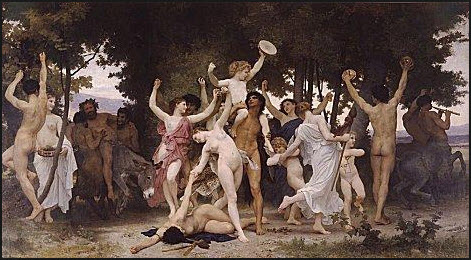 doubting the fact that Christmas is the most drunken, immoral time of the whole year. Any liquor salesman would tell you that more alcoholic beverages are bought, sold, given, and consumed at Christmas than at any other time of the year. That fact alone assures me that Christmas is not of God! If it were, it would be a time of holiness and repentance, of drawing closer to God and turning from sin. It would be a time when true spirituality and godliness abounded, but instead, just the opposite is true. The public celebrates it just as the ancient Saturnalia was celebrated, with drunkenness and office parties, with revelry and lewdness, with blasphemy and indulgence in every sort of sin imaginable. This is the true spirit behind Christmas.
doubting the fact that Christmas is the most drunken, immoral time of the whole year. Any liquor salesman would tell you that more alcoholic beverages are bought, sold, given, and consumed at Christmas than at any other time of the year. That fact alone assures me that Christmas is not of God! If it were, it would be a time of holiness and repentance, of drawing closer to God and turning from sin. It would be a time when true spirituality and godliness abounded, but instead, just the opposite is true. The public celebrates it just as the ancient Saturnalia was celebrated, with drunkenness and office parties, with revelry and lewdness, with blasphemy and indulgence in every sort of sin imaginable. This is the true spirit behind Christmas.
One writer commented, “It is a time when the world is turned over to drunkenness, revelry, debauchery, shame, and misrule. It is a time of exchanging gifts and singing religious songs called Christmas carols, and at the time, the whole world is one madhouse, religious and otherwise. The non-religious world will cover up their ungodliness and wickedness with Christmas carols, which will be played and sung in every saloon, every sporting house, every gambling hall, and every brothel all over the world. The religious world will vent to the wickedness of their hearts in these days of debauchery under the guise that they are celebrating the birthday of Christ. Thousands of church members will get drunk at Christmas when they would not get drunk at any other time. Churches will turn their buildings over to Christmas pageants, Christmas programs, Christmas trees, and exchanging gifts, with hilarity and frivolity, in the spirit of a festival. All of these, in their different spheres, will believe they are doing God’s will. Christmas Day will be a day of feasting and drinking, drunkenness and dancing, and frivolity, as very seldom witnessed at other times of the year. Is this the way to celebrate the birthday of Christ? I certainly wouldn’t want you to celebrate my birthday like that. Then how sacrilegious it is to celebrate the birthday of the Lord Jesus Christ in such a manner.” 15
5. All elements and symbols commonly associated with Christmas have pagan roots and idolatrous significance.
Haven’t you ever been curious about what Santa Claus, exchanging gifts, trees, ornaments, lights, holly, etc., has to do with the birth of Christ? Actually, they have nothing at all to do with His birth and nothing whatsoever to do with Christianity! But they do have much to do with the idolatrous pagan feast of the Saturnalia. For instance:
The Christmas tree, holly, ivy, and mistletoe greenery were widely considered symbols of immortality and fertility among the ancient pagan nations since these evergreens never lost their leaves or turned brown (symbolizing death) through the winter season, as did the other trees. Therefore, a certain reverence was attached to them by the superstitious pagans.
Says one author, “Our primitive forefathers brought in green branches at the winter solstice and used them in magical rites to ensure the return of vegetation. Roman houses were decorated with laurel and bay. And for many centuries now, Christian homes and churches have burst into greenery at Christmas time. The early church forbade the custom of savoring paganism, but it was too deeply rooted for such prohibitions to have a permanent effect. Holly, ivy, and mistletoe are the favorite decorations now, as they were in earlier times. To our ancestors, they were strong life symbols, not only because they are evergreens but also because, unlike most plants, they bear fruit in winter. By tradition, holly is masculine and ivy feminine; thus, both are needed if all in the house are to share in the blessings they imply (i.e., fertility). Mistletoe, the Golden Bough of classical legend, was held sacred by the Celtic Druids and the Norsemen. It was once called the plant of peace, under which enemies were reconciled in ancient Scandinavia. It brought good luck and fertility. It protected the house that contained it from witchcraft and was an antidote to poison. Yet, unlike holly and ivy, it never quite lost its heathen character . . .” 16
One writer stated, “Millions of young trees are annually sacrificed to satisfy America’s Christmas god, Tammuz, son of Nimrod (who became Baal) and his wife Semiramis (Ishtar or Easter).” In this illustration from an ancient Nineveh relief artifact copy from circa 2000 B.C., Nimrod/Baal is 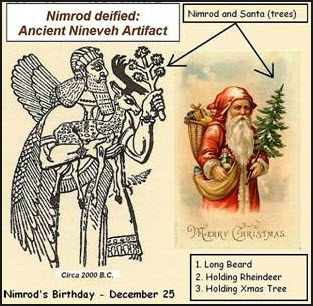 pictured holding a deer in his right hand and an evergreen tree in his left.
pictured holding a deer in his right hand and an evergreen tree in his left.
During the weeks of Christmas festivities, one is met everywhere with these dead evergreen trees arrayed in their glitter and tinsel, reminding us of the lifeless pagan gods of old. But behold! As the fervor of festivity dies down, out goes the stripped and bedraggled remains of the Christmas god into the junk pile! Yet thousands of untaught people will gladly go hungry and willingly deprive their families of necessary things in order to buy and decorate this same Christmas tree. The first decorating of an evergreen tree was done by pagans in honor of their god Adonis (Tammuz), who, after being slain, was brought to life by the serpent Aesculapius. The representation of this slain god was a dead stump of a tree. Around this stump coiled the snake Aesculapius, a symbol of restoring life. And lo, from the roots of the fallen tree comes forth another different tree – an evergreen tree symbolic to pagans of a god who cannot die! In Egypt, this god was worshiped in a palm tree as Baal-Tamar. The fir tree was worshiped in Rome as the same newborn god as Baal-Berith, who was restored to life by the same serpent, and a feast was held in honor of him on December 25th called the ‘Birthday of the unconquered Sun.'” 18
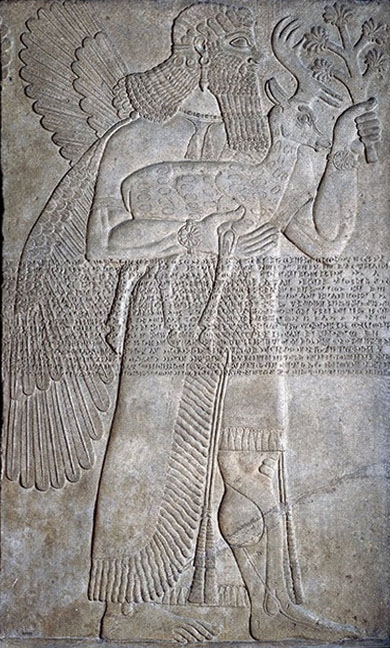
Original Babylonian stone carving of Nimrod holding a deer and an evergreen tree, Neo-Assyrian period, 865-860 BCE, housed at the British Museum, London.
In numerous Bible passages, the “green” tree is associated with false worship and idolatry.19 Since most trees are green at one time or another, these passages most certainly refer to a tree that is especially noted for being green – the evergreen. With that in mind, consider what God says in Jeremiah 10:1-5, and compare it to the present custom of decorating a tree at Christmas time:
“Hear ye the word which Yahuah speaks unto you, O house of Israel Giuseppe Zanotti low top embossed croc-effect sneakers: Thus saith Yahuah, learn not the way of the heathen . . . For the customs of the people are vain: for one cuts a tree out of the forest, the work of the hands of the workman, with the ax. They deck it with silver and with gold; they fasten it with hammers so that it moves not. They are upright as the palm tree but speak not: they must be borne because they cannot go.”
Although some commentaries have suggested that the trees mentioned in this passage were carved into the shapes of varying pagan deities, we must acknowledge that, in fact, the verses say nothing about the tree being shaped or carved at all–only that it was cut down out of the forest by a workman with an ax, and then decorated with silver and gold, just like the modem Christmas tree. In commenting on this passage, one writer well noted: “Now, of course, the people in the days of Jeremiah, as the context goes on to show, we’re actually making an idol out of the tree. We do not mean to infer that people who today place Christmas trees in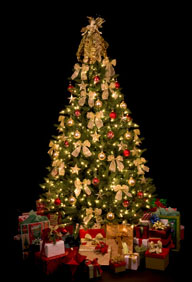 their homes and churches are WORSHIPING the tree. What we are saying is that today’s use of the tree is plainly a carryover from paganism . . .” 20 Though you may insist that you do not worship the Christmas tree, you cannot deny that the whole concept is pagan!
their homes and churches are WORSHIPING the tree. What we are saying is that today’s use of the tree is plainly a carryover from paganism . . .” 20 Though you may insist that you do not worship the Christmas tree, you cannot deny that the whole concept is pagan!
Then, too, we must mention the “dark presence” many have felt when in a dimly lit room with a Christmas tree. Not merely the overactive imaginations of “spooky” individuals, bringing these forbidden objects into your home does indeed invite another presence also–the spirits associated with the rites and rituals of the ancient pagan fertility groves, in which the evergreens played an integral part. Commenting on this, one researcher said, “The evergreen phenomenon inside a house has a presence far beyond its festive meaning. Innocent enough in a modem room or any room fully lit for the occasions, it may have quite another effect in a house not brightly lit; holly in clumps at picture level–above you, in fact–can frown darkly, gather shadows, appear to contain some sort of suspended life. Similarly, the presence of even a medium-sized Christmas tree, unlit, stands like a personage. Such impressions are not consciously welcomed, but they are part of the same thing and of a strangeness to the house with all its new reflections of tinseled glitter, its mirrors freshly alive. Nowadays, few people may notice this in the crowded time before Christmas, but it can still be felt in the quieter evenings that follow. It is a powerful time, full of ancient apprehensions. Alongside the brightness, there rides a darkness of old instincts.” 21
Discerning Christians have long realized that many objects, especially those associated with occultism or idolatry, actually attract demon spirits like magnets attract iron. Be forewarned: Christmas presents may not be the only presence around your tree! When will Christians obey God’s command to “Learn not the way of the heathen … for the customs of the people are vain.” Jeremiah 10:2
The Exchanging of Gifts
For many people, buying and exchanging gifts is the most essential part of Christmas. Many go heavily into debt to buy presents they can’t afford to give to people they don’t even like! Most assume that the Christmas tradition of exchanging gifts is a reenactment of the Magi bringing gifts to Jesus, but such is not the case. There is indisputable evidence that exchanging gifts at this time of the year was an important part of the Roman Saturnalia celebration. Said one author, “The tradition of gift-giving during the holiday season began even before there was a Christmas. Ancient Romans exchanged gifts during the winter festival of Saturnalia.” 22

Tertullian also mentions that the practice of exchanging gifts at this season was a part of the pagan Roman Saturnalia. This custom was also approved when this mid-winter festival was adopted into the Roman church. As usual, however, apostate leaders tried to find some point of similarity between the pagan and Christian religions – to make the merger seem less obvious. In this case, reference was made to the fact that the wise men presented gifts to him when they came to see the Christ child. Some suppose this is where the custom of exchanging gifts at Christmas came from. But not so. The wise men did not exchange gifts among themselves. They presented their gifts to Jesus, born king of the Jews. (It was an Eastern custom to offer gifts when coming into the presence of a king). But these gifts were not birthday gifts. 23
How do we know that these were not birthday gifts? Because the Magi (wise men) did not come to visit Jesus until He was nearly two years old! (Matthew 2:16) The shepherds came from the fields to visit Jesus at His birth, but it was almost two years later before the Magi arrived. Even if we believed that the Magi brought “Christmas presents” to Jesus, how does that justify our buying gifts for each other? Shouldn’t we instead give some sacrificial gift or offering to the church, Christ’s body? (I Corinthians 12.27) Wouldn’t that be much more consistent? After all, it is supposed to be His birthday, isn’t it? What would you think if the whole world celebrated your birthday, but no one brought presents to you? What, then, must Christ think? Everyone comes together in the celebration’s spirit and gives Christmas gifts to everyone but Him. And it’s supposed to be His birthday they’re celebrating! Sadly, people often buy so many gifts (for people who don’t really need them) that they have nothing left to give to the Lord!
One writer, in reference to this pagan custom, said, “The exchange of gifts and greetings at or near Christmas began long before Christianity. In the beginning, these presents are said to have been simple boughs of greenery from the goddess Sirenia’s groves. There were many charms as well as gifts.” 24
Did you know that the early Christians refused to exchange gifts at this time of the year? They knew where the custom came from! It was thoroughly pagan. “Because gift-giving was such an essential part of the pagan celebrations, the early church frowned upon it as sternly as upon other and more questionable New Year customs. In the first centuries, Christians did not give each other presents in the Christmas season.” 25 Christians in the United States did not practice this heathen custom of exchanging gifts at Christmas until the 19th century, 26 when the merchants revived it in order to enrich their own coffers. It’s a merchant’s holiday! As much as 50 percent of some merchants’ business is transacted at this time of year, so you know why they love Christmas.
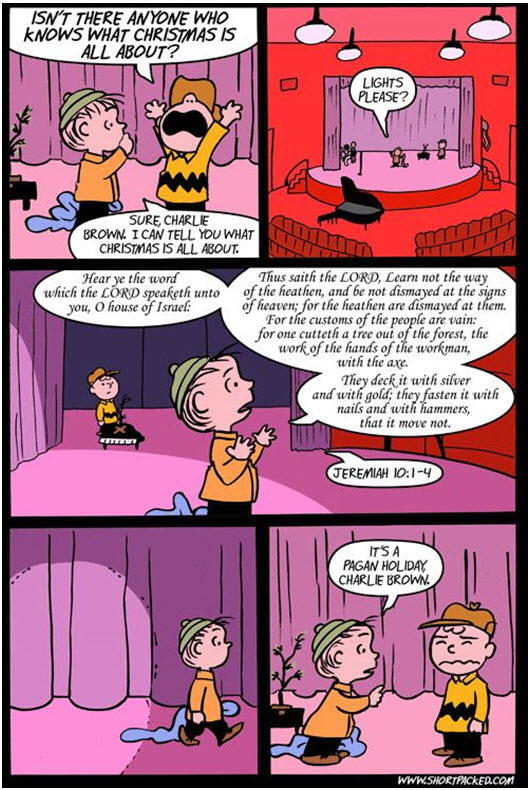
What a joyous ir jordan 11 bred game worn 1996 finals auctio liberation the people of God experience when they forsake this pagan ritual. I didn’t realize what a burden I carried until God delivered me from the whole heathen practice. Did you know that the only place in the entire Bible where the exchanging of gifts is mentioned is in Revelation 11:10: “And they that dwell upon the earth shall rejoice over them, and make merry, and shall send gifts one to another . . .” Although this sounds like Christmas, the context plainly shows it to be a wicked celebration of the death of God’s servants. Then (as of now), it will be an anti-Christian celebration. Can you see anything “Christian” in this commercial, materialistic, drunken festival? Dear reader, why don’t you give up this carry-over-from-paganism custom? Christ isn’t glorified in it. If anything, He is utterly forgotten by it!
Santa Claus
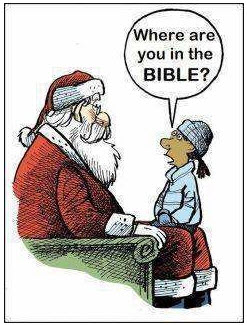 Claus was once Saint Nicholas, a kindly old saint who generously gave gifts to the needy. The facts of history, however, prove otherwise. Actually, there is no valid evidence that any “St. Nick” ever existed (despite Roman Catholic tradition). But the customs and traditions from which Santa Claus evolved trace him back to Odin or Saturn — the sun god himself! Santa has been called by many names in different countries through the centuries, but the customs surrounding him have remained steadfastly the same. He has always been “an old, old, very old white-bearded gentleman, and this is as it should be for his age is immense. Once, he was Odin, but when Christianity drove away the old gods, he remained and appeared again as St. Nicholas.” He is always mysterious and shadowy, outside the run of ordinary human experience. His home is far away in Heaven, the North Pole, or some remote country from which he comes on horseback or in a sleigh drawn by reindeer. He may come secretly by night or openly Цветные матовые непрозрачные колготки из микрофибры 3d с переливом двух цветов — цена 374 грн в каталоге Колготки ✓ Купить женские вещи по доступной цене на Шафе , Украина #124148115 in the winter daylight, accompanied by a train of masked demons and strange animal forms. Often he is associated with fire, entering the house by the chimney, or leaving gifts by the hearth” (remember, he’s a sun god), and “like the ancient gods from whom he is descended, he can read the heart and knows the hidden thoughts and actions of those he visits.” 27
Claus was once Saint Nicholas, a kindly old saint who generously gave gifts to the needy. The facts of history, however, prove otherwise. Actually, there is no valid evidence that any “St. Nick” ever existed (despite Roman Catholic tradition). But the customs and traditions from which Santa Claus evolved trace him back to Odin or Saturn — the sun god himself! Santa has been called by many names in different countries through the centuries, but the customs surrounding him have remained steadfastly the same. He has always been “an old, old, very old white-bearded gentleman, and this is as it should be for his age is immense. Once, he was Odin, but when Christianity drove away the old gods, he remained and appeared again as St. Nicholas.” He is always mysterious and shadowy, outside the run of ordinary human experience. His home is far away in Heaven, the North Pole, or some remote country from which he comes on horseback or in a sleigh drawn by reindeer. He may come secretly by night or openly Цветные матовые непрозрачные колготки из микрофибры 3d с переливом двух цветов — цена 374 грн в каталоге Колготки ✓ Купить женские вещи по доступной цене на Шафе , Украина #124148115 in the winter daylight, accompanied by a train of masked demons and strange animal forms. Often he is associated with fire, entering the house by the chimney, or leaving gifts by the hearth” (remember, he’s a sun god), and “like the ancient gods from whom he is descended, he can read the heart and knows the hidden thoughts and actions of those he visits.” 27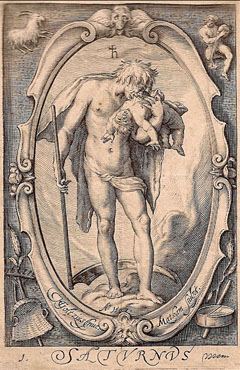 Undeniably, Santa Claus is a “god” of some sort, for he has the attributes of a deity. He can visit every house on earth in one night (omnipresence); he knows everything about every child’s behavior (omniscience); he rewards the good and punishes the bad, just like God! Even Christian parents have suggested to their own children that Santa is god by saying things like, “You’d better be good because Santa is watching you,” or “Let’s go and tell Santa what you want for Christmas,” etc. What an abomination this is in God’s sight for Christian parents to teach their children to reverence Santa instead of Him! God said, “Thou shalt have no other Gods before me” (Exodus 20:3). As one author asked, concerning a “divinity” attached to Santa Claus, “Can it be that we are back again with Odin, the ancient gift-bringer, still going invisibly about at yuletide, as in past centuries, through the lands where he was once supreme?” 28 Make no mistake, this Santa Claus is nothing less than the pagan god once worshipped as Odin or Saturn!
Undeniably, Santa Claus is a “god” of some sort, for he has the attributes of a deity. He can visit every house on earth in one night (omnipresence); he knows everything about every child’s behavior (omniscience); he rewards the good and punishes the bad, just like God! Even Christian parents have suggested to their own children that Santa is god by saying things like, “You’d better be good because Santa is watching you,” or “Let’s go and tell Santa what you want for Christmas,” etc. What an abomination this is in God’s sight for Christian parents to teach their children to reverence Santa instead of Him! God said, “Thou shalt have no other Gods before me” (Exodus 20:3). As one author asked, concerning a “divinity” attached to Santa Claus, “Can it be that we are back again with Odin, the ancient gift-bringer, still going invisibly about at yuletide, as in past centuries, through the lands where he was once supreme?” 28 Make no mistake, this Santa Claus is nothing less than the pagan god once worshipped as Odin or Saturn!
“They provoked him to jealousy with strange gods. They have moved Me to jealousy with that which is not God (Alahim); they have provoked Me to anger with their vanities.” Deuteronomy 32:16, 21
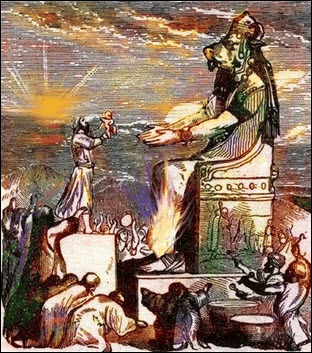
“Make no mention of the name of other gods [i.e., Santa Claus?], neither let it be heard out of your mouth.” Exodus 23:13
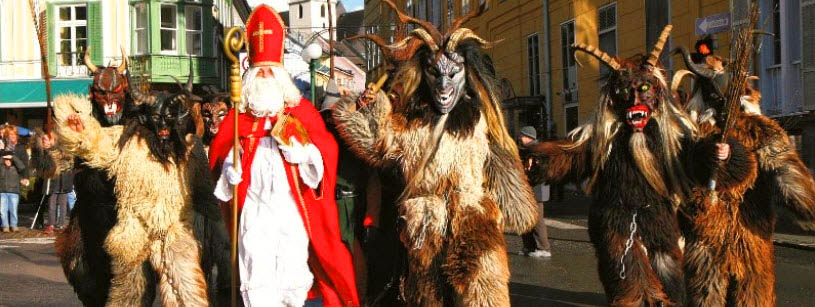
6. The early Bible Followers consistently refused to celebrate Christmas!
The Roman Saturnalia, with all of its festivities, merriment, garlands, lights, trees, exchanging of gifts, revelry, drunkenness, orgiastic sex, etc., was so thoroughly pagan and anti-Christ in nature that the faithful followers of Christ considered the whole celebration an abomination. It is well known and well documented that the early church did not celebrate Christmas at all. “Within the Christian Church, no such festival as Christmas was ever heard of till the third century, and that not till the fourth century was far advanced did it gain much observance.” 29 As previously noted, the Roman Catholic Church adopted every aspect of the Saturnalia and renamed it—supposedly sanctifying it and giving it a “Christian” significance. But it’s still a pagan festival, though it wears a Christian name!
Whenever Bible believers longed for authentic spirituality and returned to the Bible as their source for all practice and belief, one of the first things they did was to forsake the unscriptural Christmas celebration. In England in 1644, parliament banned Christmas, calling it “the Profane Man’s Ranting Day.” The Puritans disapproved of the Catholic 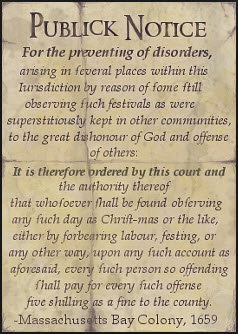 implication of “Christ’s Mass” and the worldliness associated with the holiday. 30
implication of “Christ’s Mass” and the worldliness associated with the holiday. 30
Even here in America, it was once AGAINST THE LAW to celebrate Christmas, and anyone caught doing so was fined. “In 1659, Massachusetts passed a law fining anyone caught celebrating Christmas. Throughout New England, Christmas was suppressed.” 31
Although the Catholic Christian influence was hard to suppress for long, and those laws were repealed some 20 years later, public schools remained open in Boston through December 25th until the year 1870. “In the United States, traditional Christmas customs were at first suppressed (as in England under the Commonwealth) because of the Puritan objection to them as pagan in origin, but since the middle of the 19th century, the celebrations have become increasingly popular and commercialized.” 32
Today, few Americans know that Christmas was once outlawed in their country. Of course, we are not suggesting that laws be passed banning Christmas; only that sincere followers honestly decide whether they should participate in such an unscriptural pagan festivity.
Dear reader, if Christmas was really of God, the world would hate it! But the same sinners who hate Christ love Christmas. The biggest thieves, drunkards, liars, adulterers, and hypocrites love Christmas. They love the parties, the festivities, the carols, the feasting, and the merriment, but they hate everything that is truly spiritual. That should tell us it’s wrong. For whatever the world loves, God is sure to hate!
“Whosoever therefore will be a friend of the world is the enemy of God (Alahim).” James 4:4.
“. . . As the One who called you is set-apart, so you also should become set-apart in all behavior, because it has been written, “be set-apart, for I am set-apart.” 1 Peter 1:15-16
How tragic it is that the Christian church today continues to hold this unholy alliance with the world in the celebration of Christmas. They put up the same forbidden trees in their homes Jeremiah 10:1-5)’, cover them with small spheres (symbols of the sun—remember the Saturnalia is sun worship), they hang lights and garlands all around the house and hearth (pagan symbols of fire and fertility), they lie to their children about Santa Claus (read Revelation 21:8 and see where liars go), and engage in virtually every other aspect of this renamed pagan festival, just like the world! Then, they weekly encourage their congregations to “put Christ back into Christmas.” Christ never was in Christmas, nor will He ever be! He never was a part of this fleshly, sensual, wicked festival. Even the very name “Christ-mass” smacks of the heretical rites that claim to offer up Christ as a sacrifice again and again, in a heathen “mass” (cf. Hebrews 9:26, 28).
Do not think that this pagan holiday has been sanctified simply because it has been renamed. It’s no less an abomination today than it was thousands of years ago. The Bible asks: “Can the leopard change its spots?” (Jeremiah 13:23) Of course not! You might stop calling it a leopard and start calling it a “puppy” or a “kitten,” or you could paint it white and call it a dog, but you haven’t changed its nature one iota! It’s still a leopard and still a dangerous, devouring beast. And so it is with Christmas. Underneath the sanitized “Christian” veneer, it is still the Roman Saturnalia! They’ve changed its name but not its nature. Jesus said, “A corrupt tree brings forth evil fruit,” and “A good tree cannot bring forth evil fruit, neither can a corrupt tree bring forth good fruit” (Matthew 7:17-18). Take an honest look and see the “fruit” this festival produces this holiday season. This is certainly not the fruit of repentance. You don’t see godliness everywhere you look, but ungodliness. Licentious behavior, wantonness, revelry, drunkenness, materialism, greed, covetousness, fornication, and merriment are all supposedly in celebration of the holy Son of God. How God must grieve over the brazen sin of polluting His holy name with this abominable filth.
Some Bible believers readily acknowledge the pagan origins of Christmas but offer all sorts of worldly compromising excuses and participate in it anyway. All the while declaring, “That’s not what it means to me.” Some consider it an excellent time to witness to sinners about Christ. While it is never wrong to witness, it is always wrong to sin! And you don’t have to compromise with the world in order to witness to the world. In fact, for our witness to be effective, just the opposite must be true. We must be different from the world. We must be a light set on a hill, a holy, peculiar people (cf. Matthew 5:13-16; I Peter 2:9). The Eternal Father says to His followers in our generation to come out from spiritual Babylon; come out from all that is false in religion.
“Come out of her My people, that you be not partakers of her sins.” Revelation 18:4
Yahuah once said, “My people are destroyed for lack of knowledge: because you have rejected knowledge, I will also reject you, that you shall be no priest to me: seeing thou hast forgotten the Torah [Law] of your Alahim (God), I will also forget your children. Hosea 4:6
As II Corinthians 6:17-18 says, we must “come out from among them and be separate, and touch not the unclean thing!” There can be no agreement between the temple of God and idols, no fellowship between truth and lies, and no mixture of paganism with Christianity.
“For what fellowship hath righteousness with unrighteousness? And what communion hath light with darkness? And what concord hath Messiah with Belial?” II Corinthians 6:14-15
Shall we follow the world and join with those who blaspheme and cast Yahuah out in drunkenness and revelry in the celebration of the birthday of our Lord Jesus? Never! The Scriptures say, “Thou shall not follow a multitude to do evil.” Exodus 23:2
7. But won’t we deprive the children if we don’t celebrate Christmas?
Deprive them of what? The truth? If you really want to deprive them, continue to celebrate the world’s holidays, continue to celebrate the ancient Roman Saturnalia, set up the forbidden idolatrous tree, continue to lie to your children about Santa Claus, and you will deprive them and yourself of truth, light, and their eternal reward. If you read Revelation 21:8 earlier, you know where liars go. Now read Galatians 5:20-21, and I Corinthians 6:9-10 and see where idolaters go. Bible believers, we are responsible for bringing up our children in the nurture and admonition of the Most High (Ephesians 6:4), not in the ways of the world. We are responsible for teaching them the truth and walking in it ourselves in preparation for His second coming with confident expectations!
“But the hour comes, and now is, when the true worshipers shall worship the Father in spirit and in truth: for the Father seeks such to worship Him. God is spirit (Ruach): and they that worship Him must worship Him in spirit and in truth.” (John 4:23-24)
Yahuah (the Eternal Father) is seeking those who will forsake the false customs, lay aside the traditions of men, worship Him in the beauty of holiness, and not compromise the truth!
“Yahusha [the Messiah] said unto him, I am the way, the truth, and the life . . .” John 14:6
“Howbeit when He, the Ruach (spirit) of truth, is come, He will guide you into all truth.” John 16:13
“Sanctify them through your truth; your word is truth. And for their sakes I sanctify myself, that they also might be sanctified through the truth.” John 17:17, 19
“He shall judge the world with righteousness and the people with His truth.” Psalm 96:13
Yahuah loves truth. He is concerned about the truth. He longs for those who will believe the truth and worship Him in truth! But, friend, there isn’t a shred of truth in Christmas. Everything about this holiday is false, corrupt, idolatrous, pagan, and a counterfeit of what is authentic and true. It is one BIG LIE! So what will you do? What will you follow? What will you believe?
“You cannot drink the cup of the Yahuah, and the cup of devils: you cannot be partakers of the Yahuah’s table, and of the table of devils.” 1 Corinthians 10:21
“Choose you this day whom you will serve…but as for me and my house, we will serve Yahuah.” Joshua 24:15
“For you were sometimes darkness, but now are you light in Yahuah: walk as children of light: for the fruit of the Ruach (Spirit) is in all goodness and righteousness and truth; proving what is acceptable to Yahuah. And have no fellowship with the unfruitful works of darkness, but rather reprove them.” Ephesians 5:8-11
[Note: The following 8th and 9th points have been added to Dr. Russell Tardo’s article by TheCreatorsCalendar.com, as he was not aware of these two points.]
8. The very name “Jesus Christ,” for which Christmas gets its name, was originally the Hebrew name “Yahusha haMashiach.”
Together, the Jews, Romans, and Greeks, for different reasons, over the last 1,700 years, have managed to change the actual set-apart Hebrew name of the Eternal Father “Yahuah Alahim” (H#3068 יהוה Yahuah) (H#430 אלהים Alahim) to what is now translated in English generic terms as “the Lord God,” or “Adoni” among the Jews, over 7,000 times within the pages of Scripture. As if this was not enough, the Greeks and Romans changed the name of the Messiah, Yahusha haMashiach, 981 times in the New Testament. In the 1611 King James version, His name was not Jesus but Iesus, as there was no such letter as “J” in the English language. Within 50 years, the “J” was added. But make no mistake, His ancient name never had a “J” as there remains no “J” in the Hebrew language either.
The New Testament Scriptures were originally written in Hebrew. Then, essentially 300 years following the events of our Messiah on this earth, Constantine, Emperor of Rome, created a new religion for his empire called his new deity “Iesvs Christ” and his followers “Christians.” The original name of our Messiah was replaced throughout the pages of the Brit Hadasha (N.T.). Neither of these names existed before A.D. 325. This was accomplished to cause all the world to worship the counterfeit Roman deity and a watered-down version of the supremely divine duo. How was this accomplished? This has been done through a calculated attack on the translations of Scripture as we know them in English and all the other languages, causing our Messiah’s name to appear today to be “Jesus Christ.” The real problem here is that, historically, names retain their vocalized sound when one goes to another country. Only the spelling or even writing styles will be different, but they can nearly always produce the same vocalized name. So, when it comes to Scripture, why were all the sacred names entirely removed from our translated versions?
These LIES borne on the wings of heathen traditions have served well to hide YAHUAH Alahim’s magnificent set-apart name and how it relates prophetically to His promised one true Son, YAHUSHA haMashiach, our Messiah. For “there is no other name under heaven whereby we must be saved.” (Acts 4:12)
YAHUSHA haMashiach (the Messiah) came in His Father’s name, YAHUAH, with only one Hebrew letter difference. Thus, His very name, “Yahusha” (יהושׁה), bears witness to the prophecies that He was indeed the promised LAMB of Yahuah to save His people from their sins. The “sha” (שׁה)” literally means “lamb.” Add to this the “Yahu” portion of His name, and you have “YAHUAH saves by way of the Lamb.”
Our Messiah was to fulfill all the Torah Law of the Old Testament, including requirements of the ancient Hebrew astro-luni-solar calendar as outlined in His sacred appointed Feast Days, the Creator’s only recognized Kadosh (holy) days (holidays) of the Torah. As it turns out, the real purpose of our Messiah is baked-in to only the name YAHUSHA. He alone was the LAMB who bore the sins of the world at the lunar appointed Feast of Pasch (Passover). It is these truths that define YAHUSHA as the true Messiah, for through Him alone, the Eternal Father’s compassionate love was to be manifest as the GREATEST GIFT EVER GIVEN. For more on this most provocative subject, refer to the following article: I AM YAHUAH!
9. The final nail in the coffin of this long-standing Christmas tradition is found on the true birthday of the Messiah, who died for the sins of humanity.
The actual birthday of the Yahusha haMashiach (the Messiah) has been found! Remarkably, it was there all along. It was carried on the wings of the Scriptural lunar time-measuring model and not the modern Roman Gregorian solar calendar, accepted by all the world today. The Creator’s Calendar model is identified by years that commence in spring, months that start with each full moon as the true New Moon, and weeks and days that are counted and demarcated by lunar phases from one New Moon to another (Isaiah 66:23). In this way each smaller unit of time consistently fits into the larger unit.
In order to find and celebrate His birthday, one must trace the Scriptural clues that wind their way through the remarkable lunar ordained time-measuring model, which stands out in bold opposition to the popular modern solar time-measuring model.
Below is a link to the full article explaining the AMAZING EVIDENCE of “Our Messiah’s Prophetic Birthday.” So, for now, I will leave you with the time of year. His birth occurred between late summer and early fall. To find out the exact day, click on the link below.
Refer to the article “Our Messiah’s True Prophetic Birthday.”
This article began with Dr. Russell Tardo declaring that no one knows the birthday of the Messiah. I believe he was correct at the time of his writing, as the Creator’s original Calendar remained unknown until its rather recent restoration. Knowing and honoring our Messiah’s actual birthday necessitates knowing and keeping the unpopular lunar appointed calendar of Scripture. Like all periods of human life, it is far easier to go with the flow of man-made, witty, time-measuring inventions than stand up for truth or for the ONE WHO PAID IT ALL FOR YOU AND ME.
Folks, Yahuah Alahim, the Most High Father, desires for us to know the true Birthday of His only begotten Son so we may discern the true Messiah from the impostors. The mere fact that He has taken great care to provide a detailed account of His Son’s birthday leaves each of us without excuse.
[At the writing of this article, the Messiah’s birthdate was not known, but it has now been discovered. The evidence found in Scripture is hidden in plain sight but only for those who have eyes to see. Our Messiah’s True Prophetic Birthdate.]
May the Eternal Father help us to be His set-apart people!
By Dr. Russell K. Tardo
[Note: Images have been added and the term “The Lord” has been replaced by the Hebrew name “Yahuah” in all the Scriptural passages as edited by TheCreatorsCalendar.com.
NOTES
- Christina Hole, cover sheet, Christmas and Its Customs.
- Alexander Hislop, The Two Babylons, p. 91.
- Ralph Woodrow, Babylon Mystery Religion, p. 160
- Ibid., p. 162.
- The New Catholic Encyclopedia, 1965 Ed., Vol.2, p. 656.
- Wycliffe Bible Encyclopedia, Vol. 1, p. 259.
- The Bible, Rom. 3:24-25; 5:1,9; Col. 1:22; Heb. 9:14-15,26,28; 10:10,19-20.
- George W. Curtis, Christmas, p. 9.
- Charles Haff, The Message of the Christian Jew, newsletter, Nov./Dec. 1977.
- Ralph Woodrow, Babylon Mystery Religion, p. 163.
- Encyclopedia Americana, Vol. 6, p. 623.
- Encyclopedia Britannica, 1968 Ed., Vol. 5, pp. 704,705.
- George W. Curtis, Christmas, p. 5.
- 0. M. Spencer, Christmas Throughout Christendom, p. 19.
- L. R. Shelton, Christmas, A Demon Holiday, pp. 3,4.
- Christina Hole, Christmas and Its Customs, pp. 21,22.
- Albert James Dager, “The Origins of Christmas Tradition,” Media Spotlight, p. 2.
- R. F. Becker, The Truth About Christmas, pp. 19,20.
- The Bible, Deut. 12:2, I Kl. 14:23; II Kl. 16:4; 17:10; Ezekiel 6:13.
- Ralph Woodrow, Babylon Mystery Religion, pp. 165,166.
- William Sansom, A Book of Christmas, pp. 45,46.
- Lasley F. Gober, The Christmas Lovers’ Handbook, p. 64
- Ralph Woodrow, Babylon Mystery Religion, p. 164.
- Christina Hole, Christmas and Its Customs, p. 35
- Ibid., p. 36.
- Ibid., p. 13.
- Ibid., p. 42.43.
- Ibid., p. 50.
- Alexander Hislop, The Two Babylons, p. 93.
- “Lagnlappe,” The Times-Picayune, Dec. 19, 1982.
- Ibid.
- Encyclopedia Britannica, Vol. 5, p. 705.
FAITHFUL WORD PUBLICATIONS
Post Office Box 496, Arabi, Louisiana 70032

